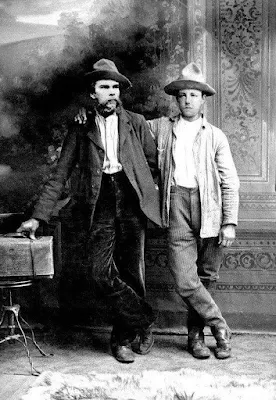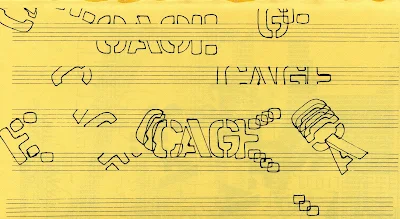Thursday, November 27, 2008
Cutting-up Atlantis (One)
Sunday, November 23, 2008
Cutting-up Atlantis
Sections Three to Five:
Friday, November 21, 2008
"Drummer Boy Raga" and Cut-ups
 |
| Vehicule Poets at Rare Books and Special Collections, McGill University giving a group reading on 26 April 2018 |
Like a collagist, selecting and snipping, Stephen immersed himself in the text, emerged with bits and phrases words, even syllables. Sometimes, his selection was to introduce fragments of what was to come, sometimes a reflection (refraction) of what had just passed. His breaking up the text in this fashion turned the piece in on itself, its meditative aspect. The work was now reaching inward as well as outward. He did not add one original phrase, not one external element, yet his contribution was instructive. In visual terms, he zoomed in on the fabric, the material, offering the work as “object”, built with breaths, words, thoughts.
Tuesday, November 11, 2008
Cut-ups, series 1.6
A SEAS
Forward! The marchweariness and anger.
To whom shall I
should I adore? What
hearts shall I break?
what blood tread?
the intractable convict
are always closing; I sought
houses he would have
with his idea I saw the blue
of the country; in the cities
more strength than a saint,
a traveler—and he,
glory and his reason.
nights, without roof, with
a voice gripped my frozen
Still but a child,
on whom the prison doors
the inns and rooming
secrated by his passing;
sky, and the flowery labor
sensed his fatality. He had
more common sense than
alone! the witness of his
On highroads on winter
without clothes, without bread,
_________________________
Cut-up of Arthur Rimbaud
Monday, November 10, 2008
Cut-ups, series 1.5
Let me sleep! Eat the pebbles that one breaks,
At the altars of Churches’ old stones;
Broth run over Gravel of ancient deluge taste,
And mix with and loaves scattered in grey brakes
ON IN HELL
At last, O happiness,
the burden and the desert,
sky the azure that is dark
of pure light. Out of
myself? What beast
clownish and blank as Poly
image is attacked? What
lies should I uphold?
_________________________Cut of Arthur Rimbaud
Sunday, November 9, 2008
Cut-ups, series 1.4
Howling beneath the leaves
with withered fist
The wolf spits out the lovely plumes
And thus no old age, no
Of his feast of fowls:
Like him I am consumed.
forsaken that to any divine
my impulses toward
Let me seethe
Solomon.
Rather steer clear of the rust
brutishness,—to lift the Cedron.
fin’s lid, to sit, to suffocate
dangers: terror is not
O reason, I brushed from the
—Ah! I am so utterly, and I lived—gold spark
image whatsoever, I took on an expression as
possible:
Salads and fruits
O my abnegation,
O Await but the picking;
below, however!
But violets are the food
De profundis, Domine, Of spiders in the thicket.
_________________________
Cut-up of Arthur Rimbaud
Saturday, November 8, 2008
Cut-ups, series 1.3
and liberty?
Alas! The Gospel!
Greedily I await God.
Cut-up of Arthur Rimbaud
Friday, November 7, 2008
Cut-ups, series 1.2
Your white
The cradle
The sparse
This year or next yearArt criticism is as imbecile as Esperanto
Brindisi Goodbye goodbye
I was born in this city
And my son too
I’ve never liked Mascagni
Nor art nor artists
I’ve envied a woman
to be a woman
Bon voyage!
Let me carry you off
You who laugh at red
to the childbearing future
I envy your ease
Ocean liners of factories
At anchor
April 1914
_________________________
Cut-up of Blaise Cendrars
Thursday, November 6, 2008
Cut-ups, series 1.1
 |
| Cutlery placement |
BOMBAY EXPRESS
Ah! what’s more: They rush out of their cells
red clearing with old courtyard
I can remember They kidnap the young prisoner
land and Christianity. I get into a carriage which
myself in the past. But They leave at top speed
; and even the langue While the guards empty their
I cannot see myself
Some of the guards jump on horses
convicts
__________________________________
Cut-up of Arthur Rimbaud and Blaise Cendrars
Thursday, October 30, 2008
The Cut-up Technique
I learned of the cut-up method in William Burroughs and Brion Gysin’s book Minutes to Go that I read in the early 1970s. I was just beginning to read my work in public and the cut-ups made a huge impression on me at the time. Indeed, the writings of Jack Kerouac and Allen Ginsberg, Gregory Corso and William Burroughs, and others, spoke to many of us in a personal and relevant way. Writing poetry was our journey and these older writers were our mentors. I also read all of Henry Miller and Anaïs Nin, and other writers that Henry Miller recommended in his The Books in my Life; indeed, that’s where I first heard of Blaise Cendrars and, possibly, J. Krishnamurti. At the time of these early public readings and performances, I was also involved with the writings of John Cage that emphasized silence, randomness, coincidence/synchronicity, and non-linearity in art.
I have always liked several things about making cut-ups: For instance, 1) the physicality (or non-cerebral aspect) of the cut-ups, using scissors and glue to create new writing; 2) the relationship of the cut-ups to making collages, which are really visual cut-ups; 3) I have always been intrigued by the randomness of the cut-ups, allowing a new voice to emerge from the writing; 4) the connection to visual art (painting, film, etc.) interested me; 5) avoiding the imposition of the ego in the writing, always seemed to me one of the objectives I was attempting to achieve in my experimental writing; 6) cut-ups can be performed using several voices, or a room full of voices, or the reading/performance can have several cut-ups read simultaneously.
The cut-ups remind us of a serious ambition in poetry, in sound poetry, in visual poetry, and in printed poetry. In my writing since the cut-ups—writing concerned with redemption and witness—the context has always been living in an existential world in which insight and affirmation of life has been hard-won. The cut-ups affirm life, they show meaning and creativity in randomness and coincidence.
Sunday, October 12, 2008
Blaise Cendrars Cut Up (four)
Gibet et de la Roue
Paris, 1913.
Avec les gestes piteux et le the oaths of the cardplayers in the
sous la pluie
Bella, Agnès, Catherine et la ne
Et celle, la mère de mon amoucles who paced nervously up and
looked at me as he passed
Il y a des cris de sirène qui me heart tears rise
Là-bas en Mandchourie un mistress…
dans un accouchement and,
Je voudrain depths of a bordello
Je voudrain n’avoir jamais fait
Motley
Like my life
And my life doesn’t keep me a full speed
Shawl
And the whole of Europe see
gold wheels whirling madly along in
universe
Cut up of “Prose of the Transsiberian and of Little Jeanne of France”, by Blaise Cendrars
Friday, October 10, 2008
Blaise Cendrars Cut Up (three)
The wings of our seven sins
And all the trains are the devil’s cup and ball
The poultry yard
The modern world
Speed is useless
In the modern world
Distances are too great
And at the end of the trip it's terrible to be a man with a
woman…
We can’t go to Japan
Come to Mexico!
On the escarpments the
Riotous vines
They seem a painter’s
Colors booming like
Rousseau was there
His life was dazzled
At Chita we had a few day’s piano and I had a raging
Five days stopover because of b
We spent it with Monsieur Iae that calm interior the father’s
me his only daughter in daughter who would come each
Then the train took off again.
And amputated limbs dance tulip trees are in bloom
raucous air tresses
Fire was on all the faces in alette and brushes
Idiot fingers rapped on all the ngs
And in the press of fear glance
In all the stations where all the
And I saw
Sleep
I would so have liked to sleep camels
I can identify all the countri more than 500 kilometers
closed it’s all I saw
And I can identify all the train
Cut up of “Prose of the Transsiberian and of Little Jeanne of France”, by Blaise Cendrars
Saturday, October 4, 2008
Monday, September 29, 2008
Blaise Cendrars Cut Up (two)
An old monk was
Novgorod.
And I, the bad poet who Still, I was a very bad poe
everywhere I couldn’t go to the end.
And also merchants still I was hungry
To go make their fortune And all the days and all
And all the shopwindows glasses
And all the houses and all I should have liked
And all the wheels of cabs and all the streets
pavements those lives
I should have liked to plus turning like whirlwinds over broken
nge them into a furnace of swords
the square
And my hands took fligh The great almonds of the
wings And the honeyed gold of
And those were the last An old monk was reading
Of the very last voyage I was thirsty
And of the sea. And I was deciphering
When, all at once, the pig
I was in Moscow, where too,
with the rustling of albatross flames
And I was not satisfied of the last day
that my eyes turned
Their train left every many dead out there
It was rumored there we rates
One took along a hundred accounts I the bank.
clocks from Blac Malmö filled with tin cans and cans
Another, hatboxes,
Revolution… omen
And the sun was a fierce hire which could also be useful
That burned like live
It was in the time of my And I should have liked
I was scarcely sixteen And tear out all the
And dissolve all those
garments that enrage
I could sense the coming
Cut up of “Prose of the Transsiberian and of Little Jeanne of France”, by Blaise Cendrar
Sunday, September 21, 2008
Blaise Cendrars Cut Up (one)
o grind up all the bones cathedrals all in white
the bells
all bodies, naked and strange under me the legend of Nizhni Novgorod
me…
of the great red Christ of the Russian letters
eons of the Holy Ghost flew up from
wound adolescence
I had already forgotten my birth
it was war
Love carted away millions of corpses
the last trains leaving
because they weren’t selling any ging to me the legend of Nizhni
going away would have liked to
didn’t want to go anywhere, could go
had enough money
corkscrews
Still another, coffins from I was trying to nourish myself with
of sardines in oil
Then there were many with the bell towers and the stations
Women with crotches for stars
Coffins
They were all patented day morning.
It was rumored there were many dead.
They traveled at reduced boxes of alarm clocks and cuckoo
And they had savings Forest
and an assortment of Sheffield
the women in the cafes and all In Siberia cannon
Hunger cold plague
them and break them And the muddy waters
In all the stations I saw
Nobody could
more tickets
And the soldiers who
stay. . .
______________________________
Cut up of “Prose of the Transsiberian and of Little Jeanne of France”, by Blaise Cendrar







